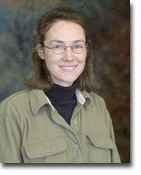| Laboratory of Neurosciences |
Intramural Program Investigators ^ Home ^ |
| Catherine A. Wolkow, Ph.D., Investigator Invertebrate Molecular Genetics Unit |
 Dr. Wolkow received her Ph.D. in 1997 in molecular biology and genetics from the Johns Hopkins University School of Medicine where she studied the regulation of transposition target site selection in bacteria. Moving to Boston, she carried out postdoctoral research as a research fellow of the Leukemia and Lymphoma Society with joint appointments at the Massachusetts General Hospital and Harvard University. During this period, Dr. Wolkow investigated longevity control by insulin-like signaling in C. elegans. This work forms the basis for current studies into the neuronal pathways under control of insulin-like signaling in C. elegans. She is also expanding her research program to investigate genes necessary for successful nervous system aging. Dr. Wolkow received her Ph.D. in 1997 in molecular biology and genetics from the Johns Hopkins University School of Medicine where she studied the regulation of transposition target site selection in bacteria. Moving to Boston, she carried out postdoctoral research as a research fellow of the Leukemia and Lymphoma Society with joint appointments at the Massachusetts General Hospital and Harvard University. During this period, Dr. Wolkow investigated longevity control by insulin-like signaling in C. elegans. This work forms the basis for current studies into the neuronal pathways under control of insulin-like signaling in C. elegans. She is also expanding her research program to investigate genes necessary for successful nervous system aging.Research Interests: Genetics of Longevity in C. elegans: The nematode, C. elegans, is quickly becoming a favorite organism for studying the genetics of longevity. Under laboratory conditions, wild-type C. elegans adults have a 2 to 3-week lifespan. Genetic mutations have been identified which allow worms to live up to three times longer. The molecular identification and characterization of the genes responsible for these mutant phenotypes has provided new insights into pathways controlling lifespan. In particular, we have learned that multiple pathways control longevity in C. elegans. Some of these lifespan pathways interact, while others function independently of the rest. In addition, C. elegans lifespan can be lengthened by caloric restriction, as has been documented for other species. Humans and nematodes share many of the same genes, so it is likely that human longevity will be controlled by some of the same genes that control C. elegans. Thus, studies of genetic control of longevity in C. elegans will help to reveal mechanisms that also control human longevity. |
| Insulin Control of Longevity: Mutations disrupting insulin-like signaling in C. elegans dramatically increase lifespan and enhance stress resistance. Animals lacking a functional insulin receptor or PI(3)K, encoded by the genes daf-2 and age-1, respectively, live two to three times longer than wildtype. Insulin-like control of longevity has been documented in other species as well. Fruitflies with defective insulin-like signaling survive longer than wild-type and mice lacking growth hormone display extended longevity. |
| The components of insulin-like signaling pathways have been conserved from C. elegans to humans. The C. elegans genome contains 37 genes encoding insulin-like genes, all potential ligands for the DAF-2/insulin receptor. Once activated, the DAF-2/insulin receptor transduces signals intracellularly via IST-1, a homolog of vertebrate IRS1-4, and via AGE-1/AAP-1, comprising the p110 catalytic subunit and p55 adaptor subunit of PI(3)K. The lipid products of AGE-1 activate downstream S/T kinases, PDK-1 and AKT-1 and -2. DAF-18, a homolog of the vertebrate PTEN lipid phosphatase, antagonizes DAF-2 signaling. Signaling downstream of DAF-2 antagonizes the activity of the forkhead transcription factor DAF-16. When DAF-2 signaling is disrupted, DAF-16 is active and can activate the expression of target genes required for long lifespan. Two candidate DAF-16 target genes have been identified, ctl-1, encoding a cytosolic catalase, and sod-3, encoding Mn-SOD. One hypothesis is that ctl-1 and sod-3 expression enhance stress resistance in daf-2 mutants, thereby extending lifespan. Consistent with this hypothesis, ctl-1 is required for long lifespan in daf-2 mutants. |
| Insulin-like signaling in neurons is required for normal lifespan in C. elegans. Animals with insulin-like signaling restricted to non-neuronal cell types live as long as daf-2 pathway mutants with no insulin-like signaling at all. A major project in this laboratory is to define how neurons control longevity. We will determine whether specific neurons control lifespan and identify downstream pathways of insulin-like signaling in the nervous system. |
| Contact Information: Laboratory of Neurosciences Biomedical Research Center, room 05C222 251 Bayview Boulevard, Suite 100 Baltimore, MD 21224-6825 Phone 410-558-8566 Fax 410-558-8323 E mail wolkowca@grc.nia.nih.gov For more information about the Laboratory: http://www.grc.nia.nih.gov/branches/lns/mgu.htm |
| IRP Home What's New Contact Us Accessibility Disclaimer Privacy Site Search Site Map NIA Home |
 |
 |
 |